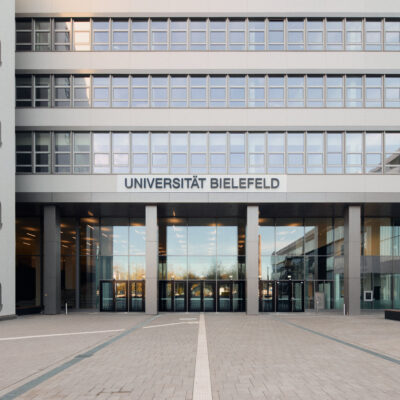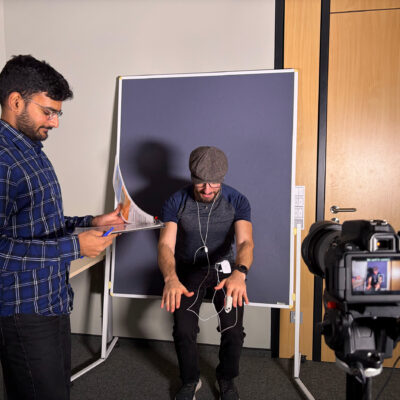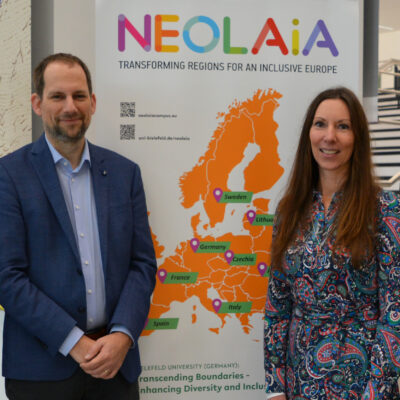Sociology professor Dr Simon Kühne at Bielefeld University’s Center for Uncertainty Studies (CeUS) conducts research on satisfaction with pandemic management in Germany. Together with colleagues, he analysed how 6,700 people in 2020 responded to a nationwide survey of their attitudes towards the measures taken during the Covid-19 pandemic. In early 2021, 6,000 of these respondents were contacted for a second time. The analysis provided insights that could help when managing future crises. In this interview, Simon Kühne explains under which circumstances public satisfaction is highest and what lessons we can learn from this.
All around the world, the Covid-19 pandemic put people in an unprecedented extreme situation. The legally prescribed measures with the accompanying restrictions on everyday life did not always meet with understanding and acceptance in the German population. Accordingly, the ways in which people responded to the prescribed measures to contain the pandemic and their willingness to behave in line with the guidelines was not the same everywhere. This observation formed the starting point for a study on satisfaction with pandemic management and compliance with measures in the healthcare sector published in the journal PLOS ONE. The study asked: how did satisfaction with the government’s efforts to respond to the Covid-19 crisis affect compliance with measures to contain the pandemic?
What prompted you to tackle this topic and conduct an extensive survey?
Simon Kühne: The emergence of the coronavirus pandemic presented not only each individual but also society as a whole with completely new challenges. We soon realized that we would need comprehensive data on the societal factors and consequences of the crisis. In particular, we assumed that the crisis would not concern and impact on everyone equally, but that groups in the population would differ in the risk they face and the costs they bear. Therefore, right at the beginning of the pandemic in spring 2020, we launched the project ‘SOEP-CoV: The Spread of Coronavirus in Germany: Socio-Economic Factors and Consequences’, funded by the Federal Ministry of Education and Research. Starting in April 2020, the project repeatedly surveyed many thousands of households throughout Germany using the survey infrastructure of the German Socio-Economic Panel (SOEP), one of the largest surveys of households in Germany that has been carried out repeatedly since 1984.

© Sarah Jonek
The German population had never experienced anything like the pandemic before. Did comparisons reveal regional differences in pandemic management?
Simon Kühne: Even within Germany, differences in pandemic management became clear, for example, not only between federal states but also at a regional level. The same applies to international comparisons: different approaches were observed particularly in terms of regulating social life, contacts, and prescribed hygiene measures. Countries took very different paths here.
Does the ‘German mentality’ impose special demands on such crisis management?
Simon Kühne: It’s difficult to say what influence a ‘German mentality’ might have had. Even in an international comparison, a range of factors that could be responsible for any potential differences. What is certain, however, is that this is the first time that the population in Germany had to face many of the measures and the behaviours associated with them in this form. Hygiene measures such as wearing masks had to be learnt more or less from scratch—measures that people were already more used to in other countries.
Which aspects were particularly important to you in the study?
Simon Kühne: The goal of the entire SOEP-CoV project was to build up a reliable database for the social sciences and other related disciplines up to and including epidemiological research. The SOEP, which is based on random population samples, is highly suitable for this. By working together with other partners and, in particular, with the Robert Koch Institute, we were able to design the content of our survey in such a way as to maximize the potential knowledge gain for a wide range of disciplines. The thematic focus was on the fields of prevalence, health behaviour, and health inequality; the labour market and employment; social life, networks, and mobility; mental health and well-being; and social cohesion.
What insights were gained from analysing the survey findings?
Simon Kühne: For a comprehensive overview of the results along with the publications of the SOEP-CoV project, please refer to our project website. In our specific analysis of pandemic management and compliance with hygiene measures, which I conducted with colleagues from the German Institute for Employment Research (IAB) in Nuremberg, we were interested in whether individual differences in hygiene-related and protective behaviour in response to the pandemic can be explained by individual satisfaction with pandemic management. If this were the case, it would provide important information for further management and for future crises—especially with regard to delivering clear communication in order to give the general public a better understanding of policy measures. And indeed, we found robust evidence of such a correlation: those who were more satisfied with the German government’s pandemic management were, on average, also more willing to personally comply with more comprehensive hygiene measures and behaviours such as wearing a mask or avoiding crowds.
Can regions be identified in which responses showed more satisfaction or regions in which the population was less satisfied than average?
Simon Kühne: Based on our data, we see a regional difference between eastern and western Germany: respondents in eastern Germany were comparatively less satisfied with pandemic management in 2020 and 2021 than respondents in western Germany.

© Sarah Jonek
Were there any unexpected results for you?
Simon Kühne: We were surprised to see what were, at times, significant regional differences within Germany. Not only satisfaction with pandemic management but also compliance with measures to contain the pandemic varied greatly from region to region. In addition to differences between eastern and western Germany, variations could also be seen on a smaller geographical level.
Could you explain this in more detail?
Simon Kühne: When comparing individual federal states, we were able to identify some significant differences in satisfaction with crisis management—and also in terms of the satisfaction in each case with the actions taken at federal, state, and municipal levels. Whereas in 2020, citizens in federal states such as Mecklenburg-Western Pomerania and Bavaria were more satisfied with management at state level compared to federal and municipal levels, respondents in Berlin and North Rhine-Westphalia were comparatively critical of crisis management. In other words, they were more dissatisfied with the actions of their state government compared to those at municipal level and by the federal government.
Do you think that in the event of another pandemic, lessons can be learnt from the measures taken and the way the population responded to them?
Simon Kühne: I can only guess how well each individual and we as a society as a whole are prepared for another pandemic. However, I am sure that certain behaviours and measures would be implemented relatively quickly across the population. Even now, with the onset of the winter wave of colds and despite comparatively low coronavirus infection figures, many people are wearing a mask to protect themselves and others—even if there is currently no obligation to do so.





